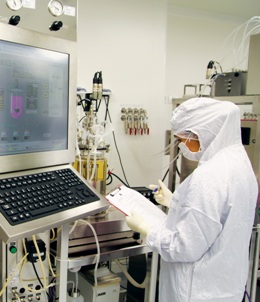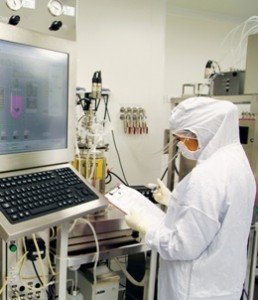Phase I Trial of Pluristem’s PLX-PAD Cells for Pulmonary Arterial Hypertension Advances To Second Cohort Dosing
Written by |


Photo Caption: “The Process is the product” – Pluristem’s 3D expansion technology allows for the production of different PLX cell products. Photo credit: Pluristem Therapeutics Inc.
Haifa, Israel based Pluristem Therapeutics Inc. a drug developer specializing in placenta-based cell therapy products, has announced that licensee partner United Therapeutics Corporation has completed the dosing portion for the first patients cohort in the company’s Phase I study, which is testing Pluristem’s novel Placental expanded (PLX-PAD) cells as a therapy for patients who have pulmonary arterial hypertension (PAH).
PAH has a relatively small patient population, affecting an estimated 15 to 20 thousand patients in the United States, most of whom are middle-aged women. However, PAH has a global market value estimated at approximately $3 billion, in large part due to the high morbidity associated with the disease — 60 to 80 percent of patients die within the first five years of a PAH diagnosis — and the lack of viable therapies. Currently approved PAH therapies can improve symptoms, primarily through the relief of vasoconstriction (e.g., by inhibiting signaling in the endothelin-1 pathway), however, none of the FDA approved therapies address the inflammation or proliferation pathways in PAH, allowing the disease to get worse and eventually lead to death. As a result, the high unmet need remains for PAH. Reata Pharmaceuticals is another biotech company currently developing a therapy for treating inflammation in PAH, and recently announced that it is currently enrolling PAH patients into its clinical trial in the U.S.
[adrotate group=”4″]
The Phase I study for PLX-PAD, which is currently being conducted in Australia, is an open-label, dose-escalation study that is designed to enroll 9 PAH patients. The first cohort of 3 patients has received 0.5 million PLX cells per kilogram body weight, and an independent Data Safety Monitoring Board recommended advancement to the second cohort.
The second cohort will receive 1 million cells per kilogram, while a third cohort is planned to be administered 2 million cells per kilogram. The study’s primary endpoint is the safety of PLX-PAD cells, to be evaluated at 12 weeks and one year after dosing. Secondary efficacy endpoints are to be measured at six weeks post-treatment in order to assess changes in the ability to exercise, disease severity and cardio-respiratory function; measures include six-minute walk distance and cardio-pulmonary hemodynamic parameters evaluated via right heart catheterization and echocardiogram.
Pluristem’s approach is to use placental cells and a unique, proprietary, three-dimensional (3D) technology platform to develop cell therapies for a broad spectrum of diseases, not just PAH. The cell products being created are derived from human placental cells which are converted into PLacental eXpanded (PLX) cells. Once administered, the cells secrete therapeutic proteins in response to signals produced by damaged tissues. All in all, the therapy is targeting diseases that involve inflammation and ischemia, such as peripheral artery disease, muscle injury, preeclampsia, and graft versus host disease. PLX cells require no tissue-matching prior to administration, making them an off-the-shelf product.
The company’s GMP-certified in-house manufacturing facilities allow it to efficiently produce commercial quantities of homogeneous, clinical-grade PLX cells. Pluristem is currently the only company manufacturing large quantities of placenta-based cell products using a 3D bioreactor. Driving these development efforts is a management team dedicated to shaping the future of the company and of placenta-based cell therapies. The Pluristem team has many decades of industry and research experience and draws on this as it continues to progress towards company goals.
[adrotate group=”3″]
 “We look forward to preliminary results for this trial in 2015, after completion of dosing in all three cohorts,” says Pluristem Chairman and CEO Zami Aberman. “This Phase I study is important to the development of our PAH program in conjunction with United Therapeutics, and we are delighted to work with United Therapeutics in advancing the promise of cell therapy to treat pulmonary diseases.”
“We look forward to preliminary results for this trial in 2015, after completion of dosing in all three cohorts,” says Pluristem Chairman and CEO Zami Aberman. “This Phase I study is important to the development of our PAH program in conjunction with United Therapeutics, and we are delighted to work with United Therapeutics in advancing the promise of cell therapy to treat pulmonary diseases.”
Headquartered in Silver Spring, Maryland, with a lab at Research Triangle Park in North Carolina, offices at Unither House, Chertsey, Surrey, U.K., Quebec, Canada, and various locations throughout the U.S., United Therapeutics Corporation is a biotechnology company focused on the development and commercialization of unique products to address the unmet medical needs of patients with chronic and life-threatening conditions. They have four approved products on the market today, and expect to add more in pursuit of “medicines for life” and continue research into treatments for pulmonary arterial hypertension, cancer, and some of the world’s most complicated viral illnesses.
The Phase I study is being conducted as part of a 2011 licensing agreement between United Therapeutics and Pluristem. Pursuant to the agreement, United Therapeutics will develop, market and sell Pluristem’s PLX-PAD cells for PAH. Pluristem is eligible to receive up to $55 million based on successful achievement of clinical milestones and commercialization, and reimbursement of certain R&D costs. Following commercialization, United Therapeutics will purchase commercial supplies of PLX-PAD cells from Pluristem at a specified margin over Pluristem’s cost, and will pay royalties at a percentage of its gross profits.
“Our vision at Pluristem Therapeutics is to leverage our position as a global leader in placenta-based cell science to become the worlds leader in developing and manufacturing cell therapy products,” says Mr. Aberman. “We believe our cutting edge technology can produce therapies that will become the standard of care for treating a host of inflammatory and ischemicconditions. We also believe ‘the process is the product.’ This reflects our view that precise control of the entire process, from obtaining cells from the source, to delivery to the patient, is vital to the success of a cell therapy product. Our fully automated process, proprietary 3D cell expansion technology and increasing knowledge of the placental cell drive us towards the development of additional product candidates for new indications and markets.”
Pluristem has a strong intellectual property position, Company-owned GMP certified manufacturing and research facilities, strategic relationships with major research institutions and a seasoned management team. For more information visit:
https://www.pluristem.com
Sources:
Pluristem Therapeutics Inc.
United Therapeutics Corporation
The Pulmonary Hypertension Association
Image Credits:
Pluristem Therapeutics Inc.



